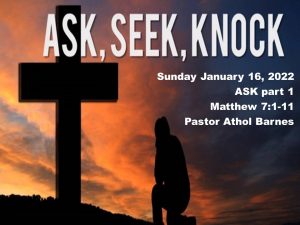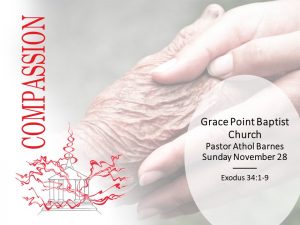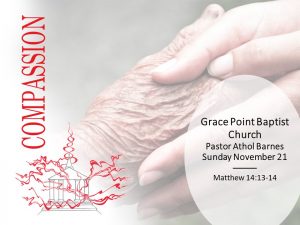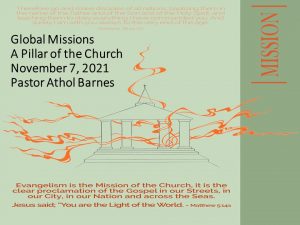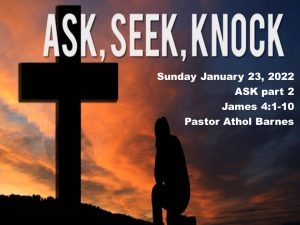
Before You Ask
James 4:1-10
When my son Joshua wants to ask me for something that he knows I might not want to give him, he uses a lot of strategy and downright emotional manipulation. He is a master of the ask. He prepares me for the question, softens me up and then when he thinks the moment is right, he makes his case.
Sometimes as children of God, we think we must prepare God for our ask. But I would propose rather that we need to prepare ourselves before we ask God for what we want.
God is not a mean vindictive father who withholds blessings until we get our act together. Matthew 7:11 says, “…how much more will your Father who is in heaven give good things to those who ask him!”
But, what does it mean to prepare ourselves to ask God? I am talking about the personal pursuit of holiness and purity that we are all called to as followers of Jesus.
James was dealing with conflict in the church as a result of the people embracing sinful lifestyles (see James 4:1). Some of the members of the church in Jerusalem were seeking pleasure by running after things which they thought would bring them joy. Things that were contrary to the perfect will of God.
God designed us to enjoy things and to find pleasure in things, so that is not wrong, but the driving desire for pleasure that is selfish is the problem. Looking to the world to satisfy what only God can, leads to dissatisfaction, pain, and broken lives. This is the result of a prayerless and selfish lifestyle.
The battle for holiness is fought in the mind. How healthy are the thoughts you entertain?
In verse 4, James exposes that as Christians, we have a singular allegiance, and that is to Christ alone. He calls our friendship with the world as spiritual adultery.
What are the affections of your heart? Do you find yourself thinking about; sexually immoral things, the accumulation of possessions, a certain addiction you entertain, how to manipulate people or situations for your own personal gain? Do you entertain sin by the movies you watch, the music you listen to or the places you go to?
Some may say that I am being old fashioned and that we need to stay away from challenging people’s moral decisions. But God’s requirement for holiness has never changed, and as James tells us, by accommodating these things, we are making ourselves enemies of God. You are making yourself the enemy of the one who gave His son for your salvation. It is time that we challenged each other in the area of purity.
We pray for revival, and historically a revival is a move of God that is characterized by repentance and people crying out to God for mercy as they were made aware their sins.
The question is, do we want this? Or are we comfortable and satisfied with weak and ineffectual Christian lives? We are no different to the world, we don’t take holiness seriously, we don’t take sin seriously. We fear man more than we fear God.
When we entertain sin in our lives and in the lives of the people around us, we are making ourselves the enemy of God. Sin is never personal; it affects all those around us. There are no private sins. When we entertain sin, we cheapen the grace of God, and we grieve the Holy Spirit.
But there is good news! As followers of Jesus filled with His spirit, when we fall and run after the pleasures that are contrary to the will of God for our lives, we are still greatly loved by our Heavenly Father. He is jealous for us, and He yearns for us to return to him.
When we sin, God does not stop loving us as that would be contrary to His nature. When we sin, God’s love for us is on full display. He reaches towards us to prevent us from hurting ourselves.
The root of all sin is pride, and that is where we need to start. We need to be humble and repent of our sins. Here is the amazingly good news of the Gospel, God offers us salvation freely and he offers his grace freely to grow in humility (James 4:6).
With humility as our starting point, we see a list of remedies for our sin in the following verses. James gives a prescription for our struggle with sin. It is only by the grace of God, but as we follow this prescription, we will know joy, peace, power, and freedom in our Christian lives.
The prescription is found in verses 7 -10, Submit yourself to God, resist the devil, draw near to God (meditating on His word and time in prayer and worship), cleanse your hands (repent of your sins), purify your heart (Psalm 51:10), mourn and weep, humble yourself.
Finally, we come to the closing phrase of verse 10, “and He will exalt you”
We must be careful; this is not an exalting in the way we would exalt a hero or a sports star. James means that after you have humbled yourself, repented and mourned over your sin, then He will lift you up. He will restore your identity. He will restore your standing before the throne of grace. Then you will live and thrive, living from your identity of who you are in Christ.
When we are not humble and in a right relationship with God, we are not going to ask for things that are on God’s heart, the things that are good for us.
Once we prepare our hearts and minds, once we humble ourselves and repent, only then will we know the perfect will of God and we will want what He wants.
What area of your life is God inviting you to deal with today?


